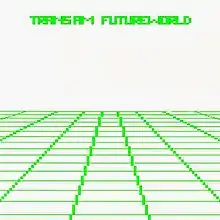| Futureworld | ||||
|---|---|---|---|---|
 | ||||
| Studio album by | ||||
| Released | March 23, 1999 | |||
| Genre | Post-Rock | |||
| Length | 47:42 | |||
| Label | Thrill Jockey[1] | |||
| Producer | Trans Am | |||
| Trans Am chronology | ||||
| ||||
| Review scores | |
|---|---|
| Source | Rating |
| AllMusic | |
| NME | 6/10[3] |
| Pitchfork | 8.0/10[4] |
| Spin | 8/10[5] |
Futureworld is the fourth album by the American band Trans Am, released in 1999.[6] The band uses lyrics in their songs for the first time, employing vocoder synthesis.[7]
Critical reception
Trouser Press wrote that "the heavily processed, robotic singing takes a back seat to the grooves that nearly imprison these songs with their droning insistence."[8] The Village Voice called the album "arguably [the band's] definitive futurist new wave statement."[9]
Track listings
- "1999"
- "Television Eyes"
- "Futureworld"
- "City In Flames"
- "AM Rhein"
- "Cocaine Computer"
- "Runners Standing Still"
- "Futureworld II"
- "Positron"
- "Sad and Young"
Additional tracks on Japanese release
- "Alec Empire is a Nazi/Hippie"
- "Am Rhein (Party Mix)"
- "Woffen Shenter"
- "Thriddle Giggit Dream"
- "Ardroth Marketplace"
References
- ↑ "Futureworld". www.thrilljockey.com.
- ↑ "Futureworld - Trans Am | Songs, Reviews, Credits | AllMusic" – via www.allmusic.com.
- ↑ "NME.COM - Trans Am - Futureworld - 15 April 1999". NME. October 17, 2000. Archived from the original on 2000-10-17.
- ↑ "Trans Am: Futureworld". Pitchfork.
- ↑ "Reviews". Spin. 15 (4): 166, 168. Apr 1999.
- ↑ "Trans Am | Biography & History". AllMusic.
- ↑ Klein, Joshua (29 March 2002). "Trans Am: Futureworld". Music.
- ↑ "Trans Am". Trouser Press. Retrieved 16 July 2021.
- ↑ "Q&A: Trans Am's Nathan Means On Playing And Reissuing 1999's Futureworld, Being A Part-Time Band And Re-Recording Their First Album". The Village Voice. October 6, 2011.
This article is issued from Wikipedia. The text is licensed under Creative Commons - Attribution - Sharealike. Additional terms may apply for the media files.